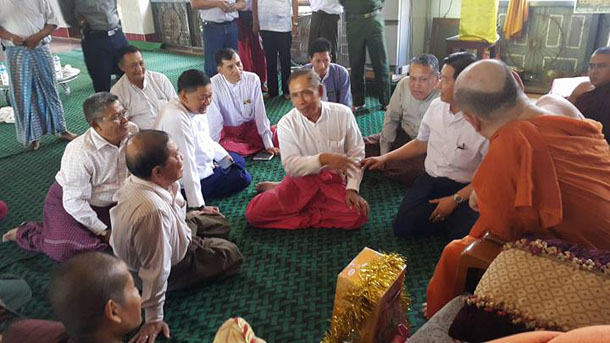RANGOON — The Burmese government’s chief peace negotiator recently visited Mon State in the country’s southeast, delivering a strong message that the minority will be limited to observer status during political discussions if it does not accede to a nationwide ceasefire agreement.
A central committee member of the New Mon State Party (NMSP), the state’s ethnic armed organization, told The Irrawaddy that Union Minister Aung Min met with influential monks over the weekend before convening with the group’s leadership and urging them to sign the peace pact in advance of a Nov. 8 general election.
The NMSP official, Banyar Leir, said the minister “told us that eight [ethnic armed] groups informed the government that they are ready to sign the NCA [nationwide ceasefire agreement]. This is on Oct. 10, as planned by the government. He wanted our group to sign along with them.”
Banyar Leir, who was present at the meeting between Aung Min and the NMSP leadership, said the minister informed them that if they do not sign the accord they will not be able to play an active role in political dialogue set to commence within 90 days of the pact.
“He told us our Mon [representatives] will have a chance to join the political dialogue whether we sign or not, but we can only be observers. We can attend the dialogue, but we can’t talk at the talks,” he said.
A number of ethnic armed groups have now sent representatives to Chiang Mai, northern Thailand, for a three-day leadership summit in advance of the next round of talks with the government in early October.
The NMSP held a central committee meeting in the days before the summit, at which they reaffirmed their decision not to sign the accord unless it is inclusive of a number of armed groups that the government currently does not accept.
Three armed groups—the Arakan Army (AA), Myanmar National Democratic Alliance Army (MNDAA) and the Ta-ang National Liberation Army (TNLA)—are viewed as illegitimate by the government and hence excluded from the pact, though several eligible stakeholders have vowed to abstain until the deal is made all-inclusive.
The AA, TNLA and the MNDAA have all been active allies of the Kachin Independence Army (KIA) during conflict in northern Shan State, and the KIA, the only group eligible for the nationwide pact without a bilateral ceasefire with the government, has also insisted that they be looped in. Several other groups that were initially ostracized have been invited into the discussions as they are not active combatants, though a number of them declined to participate.
The armed groups that have expressed readiness to sign a pact next month are the All Burma Students Democratic Force (ABSDF); Arakan Liberation Party (ALP); Chin National Front (CNF); Democratic Karen Benevolent Army (DKBA); Karen National Liberation Army-Peace Council (KNLA-PC); Karen National Union (KNU); and the Pa-O National Liberation Organization (PNLO).
The Restoration Council of Shan State (RCSS) was initially among those ready to accede, though its willingness has waned since coming under aerial attack by the Burma Army over the past two weeks.

















